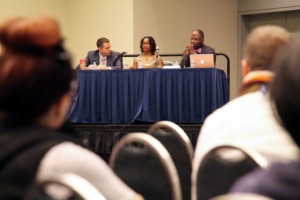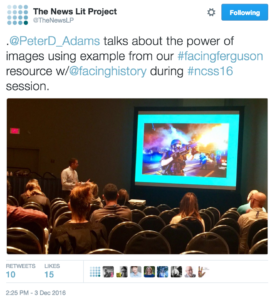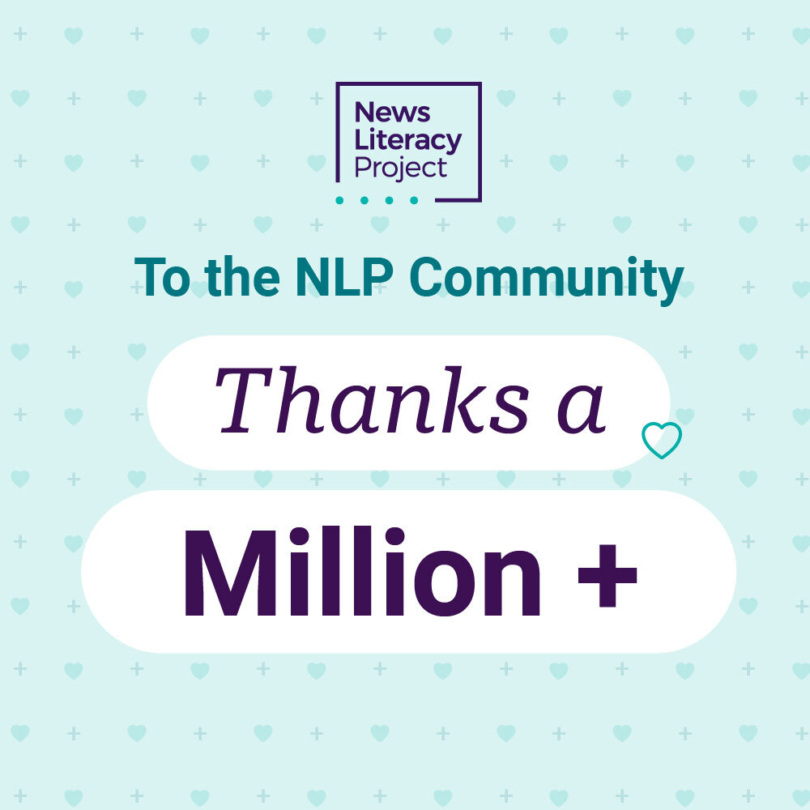NLP brings much-needed news literacy training to NCSS at a critical time
Peter Adams, NLP’s senior vice president for education programs, led a workshop on how educators can use authentic examples of viral rumors to drive civic learning and engagement.
The session couldn’t have come at a better time. With little regulation or controls, social media platforms occupy a greater and greater space in the public attention zone. And after a divisive presidential campaign where rumors, innuendoes and outright lies often competed for air time with conventional political rhetoric, educators are grappling with ways to address the spread of fake news and looking to engage their students’ critical thinking.
“Disinformation is getting better and sneakier,” Adams said during the session. “The good news is that the tools to check it out are getting better and more plentiful.”
Adams then joined Washington Post reporter Krissah Thompson and Steven Becton of Facing History and Ourselves for a panel discussion about the critical role of credible information in a robust democracy, through the lens of the news and information that appeared following the 2014 shooting of Michael Brown in Ferguson, Missouri. Adams talked about confirmation bias, in which people interpret or recall information in a way that confirms pre-existing beliefs and ideas.

“Our feelings congeal almost immediately,” Adams said when describing a phenomenon that is also known sometimes as confirmatory bias or myside bias. “Then our rational mind sets about justifying why we have the feelings we have.”
NLP partnered with Facing History to develop “Facing Ferguson: News Literacy in a Digital Age,” an educational resource examining the information aftermath of the shooting of Michael Brown and the protests that followed, which became a flashpoint for discussion about race, policing and justice.
 Adams and Becton also led a session introducing and exploring the resource.
Adams and Becton also led a session introducing and exploring the resource.
Teachers who stopped by NLP’s booth at the conference on Friday had the chance to meet three of the NLP journalist fellows featured in the Checkology™ virtual classroom. James Grimaldi of The Wall Street Journal, who appears in a lesson on the watchdog role of journalists in American democracy, Tracie Potts of NBC News Channel, who guides students through a lesson on filtering information according to its primary purpose, and Matea Gold of the Washington Post, who hosts a lesson on viral content, were all on hand to meet teachers.
The conference closed with a keynote panel, “Demasclerosis: The Challenge of Moving America Forward in a Hyper-Partisan Age,” produced by NLP and moderated by longtime broadcast journalist and NLP journalist fellow Ray Suarez, and featuring two of the nation’s leading columnists and commentators, Ruth Marcus and Michael Gerson, both of The Washington Post.
“You need citizens who show civility, empathy and discernment about the truth,” Gerson said. He encouraged the hundreds of educators in the room to teach citizenship because, more than ever, they are “on the front lines of defending the American ideal.”
The audience of hundreds of social studies teachers from around the country responded with a standing ovation.
